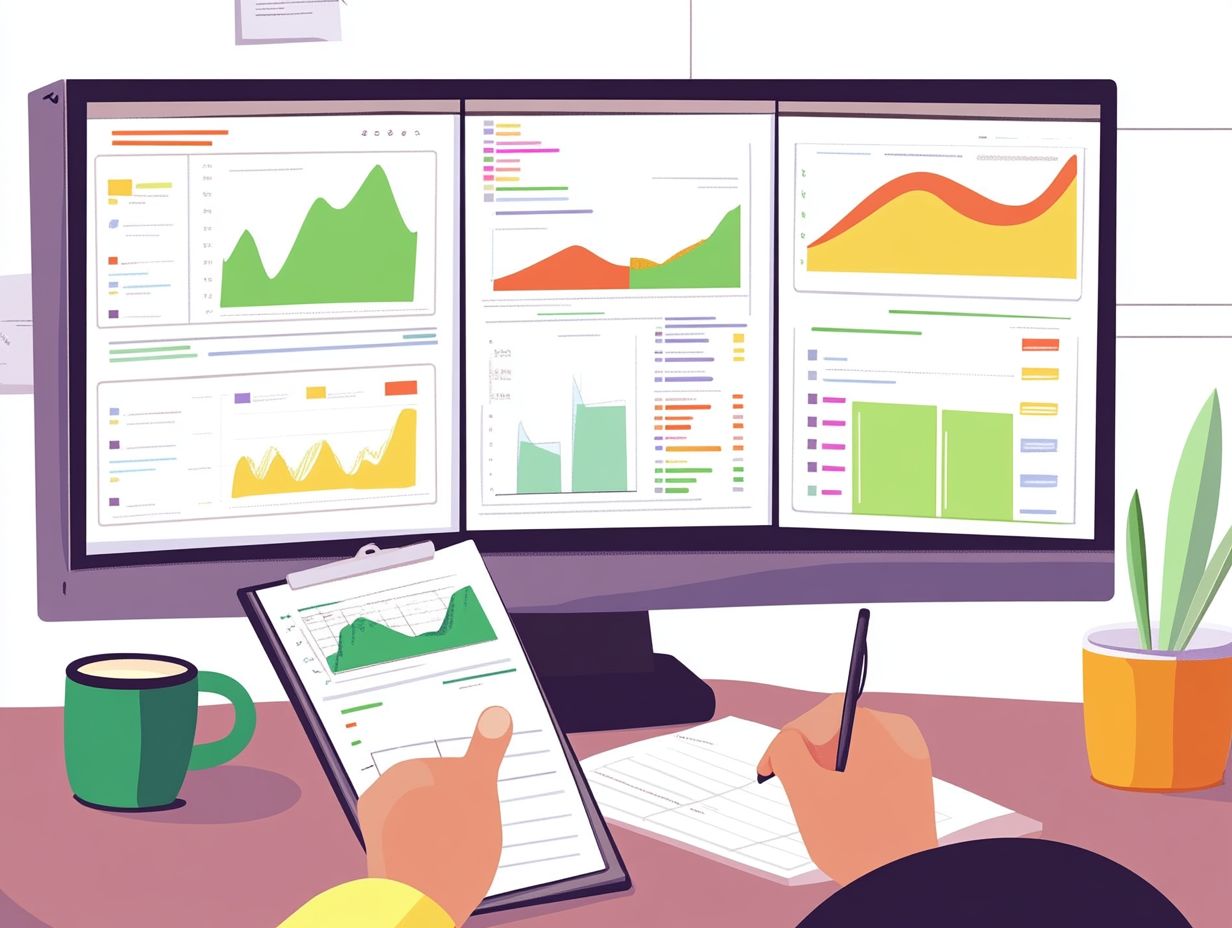How to Choose Between CRM Software Options?
In today’s competitive landscape, mastering customer relationship management (CRM) is essential for you if you want to enhance engagement and drive growth.
Selecting the right CRM software can feel like navigating a labyrinth with countless options at every turn. This guide will help you break down the critical factors to consider such as your business needs, budget, and user-friendliness while also examining the various types of CRM solutions available, from cloud-based systems to industry-specific tools.
You’ll find reviews of top contenders, highlighting their features, pros, and cons, all designed to empower you in making an informed choice. Get ready to transform how you connect with your customers and boost your success!
Contents
- Key Takeaways:
- Key Factors for Choosing Your CRM
- Types of CRM Software
- Top CRM Software Options
- How to Make the Final Decision
- Frequently Asked Questions
- 1. How can I determine which CRM software option is best for my business?
- 2. What should I look for when comparing different CRM software options?
- 3. How do I determine the cost of different CRM software options?
- 4. Can I try out different CRM software options before committing to one?
- 5. Are there specific industries or businesses that certain CRM software options are better suited for?
- 6. How important is customer support when choosing between CRM software options?
Key Takeaways:

Identify your business needs and goals to determine the most suitable CRM software option.
Consider the cost and budget, as well as integration and customization capabilities, when choosing between CRM software options. For more insights, check out how to evaluate CRM software providers.
What is CRM Software?
CRM software, or Customer Relationship Management software, is an essential asset for your business, enabling you to manage customer interactions and elevate the customer experience.
It acts as a comprehensive platform for tracking customer data and enhancing your marketing campaigns, ultimately resulting in improved customer retention and increased revenue.
Renowned CRM solutions like Salesforce and HubSpot provide powerful tools that help businesses manage relationships effectively.
These tools are essential for organizations like yours that seek to make data-driven decisions and enhance sales efficiency. This type of software serves various purposes, from automating routine tasks to providing valuable insights into customer behavior and preferences.
Analytical CRM helps you analyze customer data to refine your business strategies, while operational CRM optimizes daily operations, boosting productivity.
Collaborative CRM enhances communication across various departments, ensuring that customer interactions are cohesive and seamless. This, in turn, improves overall customer satisfaction.
By leveraging these diverse functionalities, you not only cultivate stronger relationships with your clients but also optimize your internal processes, paving the way for sustainable growth and a competitive edge in the market.
Key Factors for Choosing Your CRM
When you’re choosing the right CRM software for your business, several important factors will shape your decision. Start by assessing your specific business needs and goals; this clarity will guide you toward the most suitable options. For more insights, check out this guide on how to choose CRM software for small business.
Budget constraints are another key consideration, as finding a solution that fits within your financial parameters is essential. You ll also want to evaluate integration capabilities with your existing tools, ensuring a smooth transition and cohesive workflow.
Customization options should not be overlooked, as tailoring the software to meet your unique requirements can enhance its effectiveness.
Also, consider the level of customer support and training available for your team robust support can make all the difference in successful implementation.
Lastly, prioritize a user-friendly interface and strong data security measures, both of which are vital for providing a seamless experience and safeguarding sensitive customer information.
Business Needs and Goals
Identifying your business needs and goals is the essential first step in selecting the right CRM software; it lays the groundwork for enhancing customer interactions and elevating sales efficiency.
By understanding whether your focus is on improving customer service, streamlining sales processes, or increasing revenue generation, you can tailor the CRM solution to align perfectly with your objectives.
For example, if your primary aim is to enhance sales pipeline management, you’ll want CRM features that offer robust tools for tracking leads and monitoring sales stages.
Conversely, if managing customer data is a top priority, you ll need functionalities that provide comprehensive analytics and enable segmented customer profiles.
Aligning CRM capabilities with these distinct objectives not only improves strategic oversight but also enables your teams to leverage data more effectively.
This customized approach fosters better decision-making and ultimately drives you toward achieving your ambitious business targets.
Start exploring your CRM options today and elevate your customer interactions!
Cost and Budget
The cost of CRM software is crucial for your organization. It directly influences your budget and overall financial strategy. When evaluating pricing structures, look for budget-friendly alternatives that align with your needs without sacrificing essential features like marketing automation or reporting and analytics.
To effectively navigate budgeting, consider the pros and cons of various pricing models, such as subscription-based services versus one-time purchases. Companies like HubSpot and Zoho offer competitive tiered pricing options that can scale as your business grows, catering to diverse budgets while ensuring robust functionality.
Integration and Customization

Integration and customization options are important factors to consider when selecting CRM software, as they significantly influence how well the system adapts to your existing business processes. A CRM that offers seamless integration with your other tools and robust customization capabilities enables you to automate workflows and secure your data while tailoring functionalities to fit your specific needs.
For example, integrating a marketing automation platform like HubSpot can elevate your lead generation efforts by facilitating data flow between your marketing and sales teams, ensuring that no lead ever slips through the cracks. Incorporating tailored dashboards can enhance your user experience by presenting relevant metrics at a glance, allowing for quicker decision-making.
Features such as personalized email templates and segmented contact lists can transform your interactions into more meaningful and engaging experiences. Ultimately, these elements enable you to operate more efficiently and effectively, fostering a seamless and personalized approach to customer relationship management.
User-Friendliness and Training
A user-friendly interface in CRM software is important for ensuring you can quickly adapt and utilize the system effectively. You cannot afford to overlook training and onboarding. By providing comprehensive training and efficient customer support, you can significantly enhance your experience and overall adoption of the system.
When you prioritize these elements, you re not just streamlining the transition to new software; you re enabling your team to fully leverage CRM capabilities. Ongoing support is crucial for addressing challenges that may arise after onboarding, fostering a culture of continuous learning and improvement.
This proactive approach equips you with the confidence to explore advanced features, ultimately driving stronger customer relationships. Regular feedback loops and updates from support teams further ensure that the CRM system evolves alongside your needs, making it an invaluable tool for enhancing productivity and collaboration across departments.
Types of CRM Software
You ll find a diverse array of CRM software options available, each meticulously designed to address distinct business requirements, whether you prefer cloud-based or on-premise solutions. You can explore various CRM categories, including:
- Strategic CRM for your long-term planning
- Operational CRM, which helps manage everyday business tasks
- Analytical CRM, which helps you generate detailed reports to understand your business better
- Collaborative CRM to foster enhanced teamwork and communication
Explore these options and find the perfect fit for your business today!
Cloud-based vs On-premise
The choice between cloud-based and on-premise CRM software can greatly impact how easily your team can work, data security, and mobile accessibility.
Cloud-based solutions let you access your data from almost anywhere. On-premise systems give you more control over data and security but come with higher maintenance costs and a heftier upfront investment.
As you explore these options, it’s essential to consider long-term costs tied to software licensing, updates, and IT support. Cloud-based CRMs often operate on a subscription model, which might seem budget-friendly initially but can lead to rising cumulative expenses over time.
On the other hand, on-premise solutions usually require a significant initial outlay and demand dedicated resources for installation and ongoing maintenance.
Accessibility is crucial in today s work environment, especially as remote teams become increasingly common. Cloud options excel in facilitating collaboration, enabling users to seamlessly integrate and work from various locations. In contrast, on-premise systems can restrict flexibility, often relying on local networks for access.
Ultimately, your decision should reflect your specific needs and infrastructure, ensuring that you choose the solution that best aligns with your business objectives.
Industry-specific Solutions
Industry-specific CRM software solutions are designed to meet the unique needs of different sectors, offering specialized features that significantly enhance how you work with your customers.
Take the healthcare sector. Here, CRM systems prioritize patient management and regulatory compliance, ensuring that healthcare professionals like you can deliver timely and relevant care.
In real estate, these tools streamline property management while enhancing client relationships by meticulously tracking listings, viewings, and client preferences.
Such tailored functionalities enable seamless operations and foster stronger connections between businesses and their clients, ultimately leading to improved satisfaction and retention rates. By addressing the unique challenges of your industry, these CRM solutions become invaluable assets, enabling you to thrive in competitive markets.
Top CRM Software Options

When selecting the best CRM software options, you should explore renowned platforms such as Salesforce, HubSpot, Pipedrive, and Zendesk. Additionally, it’s important to know how to evaluate CRM software vendors to ensure you make the right choice.
These solutions are celebrated for their robust features and capabilities, but each comes with unique advantages and drawbacks that can significantly influence your decision.
Features, Pros, and Cons
Analyzing the features, pros, and cons of leading CRM software options like Salesforce, HubSpot, Pipedrive, and Zendesk allows you to understand what to look for in a CRM, enabling you to make informed decisions tailored to your operational needs and budget.
- Salesforce: Its robust customization options make it a standout choice for larger enterprises. However, it may be overwhelming and costly for smaller companies.
- HubSpot: Known for its user-friendly interface and a free tier that attracts startups. Some users argue it lacks advanced features.
- Pipedrive: Excels in sales pipeline management but may not provide comprehensive analytics like other options.
- Zendesk: Shines in customer support functionalities but can be pricey for those needing only basic CRM features.
By carefully evaluating these aspects, you can pinpoint which CRM aligns perfectly with your strategic goals and available resources.
How to Make the Final Decision
Take an exciting look at your options for selecting the right CRM software solution. To make an informed decision, consider how to evaluate CRM software options based on various factors like features, cost, and user feedback.
Each option deserves careful consideration, especially regarding how well it aligns with your business goals and enhances your ability to make data-driven decisions.
Evaluating Options and Making an Informed Choice
Thoroughly evaluating CRM options is essential for making an informed choice that aligns with your business needs. Understanding how to get started with CRM software involves gathering customer feedback and assessing user experience. It allows you to streamline your decision-making.
Using data to drive your decisions makes your CRM software more effective. Adopting a data-driven approach can significantly enhance your selection process.
To successfully navigate the vast array of available Customer Relationship Management software, consider a blend of methods, including hands-on trials, demonstrations, and comprehensive reviews on CRM integrations.
Leveraging user feedback illuminates the software’s practicality and usability while revealing areas that may need improvement.
Consulting case studies from businesses in your industry offers valuable insights into how various systems perform in real-world scenarios. Implementing a trial phase enables your team to test the software in your environment, ensuring it integrates seamlessly with existing workflows and ultimately leads to a more effective adoption process.
Frequently Asked Questions
1. How can I determine which CRM software option is best for my business?

When choosing between CRM software options, assess your business needs and goals. It’s important to understand how to choose the right CRM software by considering factors such as budget, features, scalability, and ease of use to find the best fit for your company.
2. What should I look for when comparing different CRM software options?
Key features to consider when comparing CRM software options include customization, integration capabilities, customer support, and ease of use. It’s also important to evaluate the software’s reporting and analytics capabilities.
3. How do I determine the cost of different CRM software options?
The cost of CRM software can vary greatly depending on the features and services included. Look for pricing plans that fit your budget and offer the necessary features for your business. Also, consider the potential return on investment and long-term costs of each option.
4. Can I try out different CRM software options before committing to one?
Yes! Many CRM software providers offer free trials or demos for their products. This allows you to test the software and see if it meets your business needs before making a purchase decision.
5. Are there specific industries or businesses that certain CRM software options are better suited for?
While most CRM software can be customized for various industries, some options may cater more specifically to certain sectors. Researching and reading reviews can help you determine which software may be a better fit for your industry or business type.
6. How important is customer support when choosing between CRM software options?
Customer support is a crucial factor when selecting CRM software. Look for providers that offer various support options such as live chat, phone support, and email support. It is also beneficial to read reviews and seek recommendations from businesses in your industry.
Ready to find the perfect CRM software for your business? Start your free trial today!






